Unit 2 Lessons in life Developing ideas Reading 课件(共39张,内嵌音频) 2024-2025学年高二英语外研版(2019)选择性必修4
文档属性
| 名称 | Unit 2 Lessons in life Developing ideas Reading 课件(共39张,内嵌音频) 2024-2025学年高二英语外研版(2019)选择性必修4 |
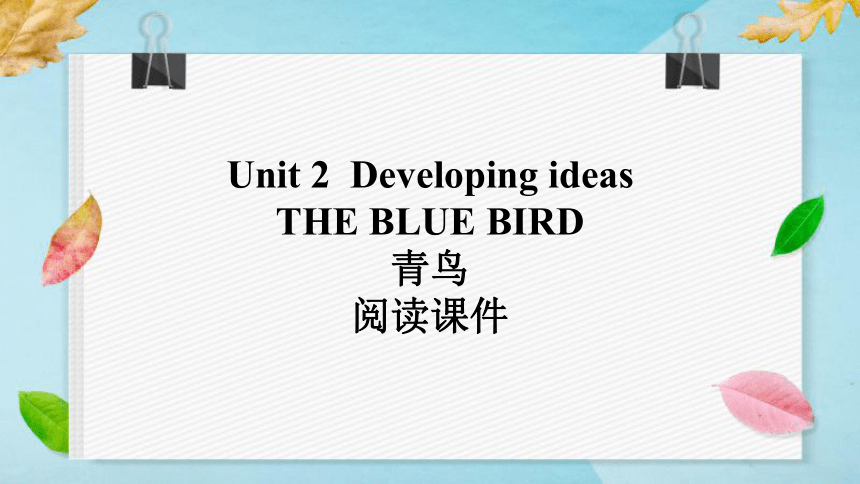
|
|
| 格式 | pptx | ||
| 文件大小 | 9.4MB | ||
| 资源类型 | 教案 | ||
| 版本资源 | 外研版(2019) | ||
| 科目 | 英语 | ||
| 更新时间 | 2025-04-23 00:00:00 | ||
图片预览

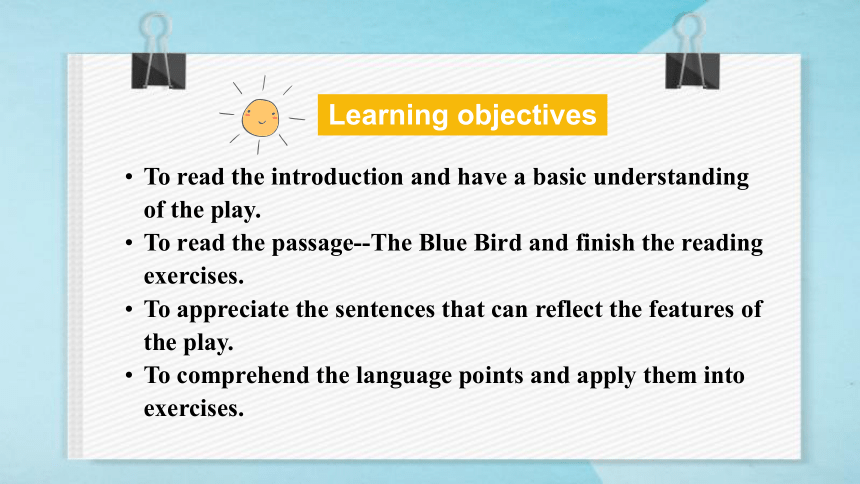
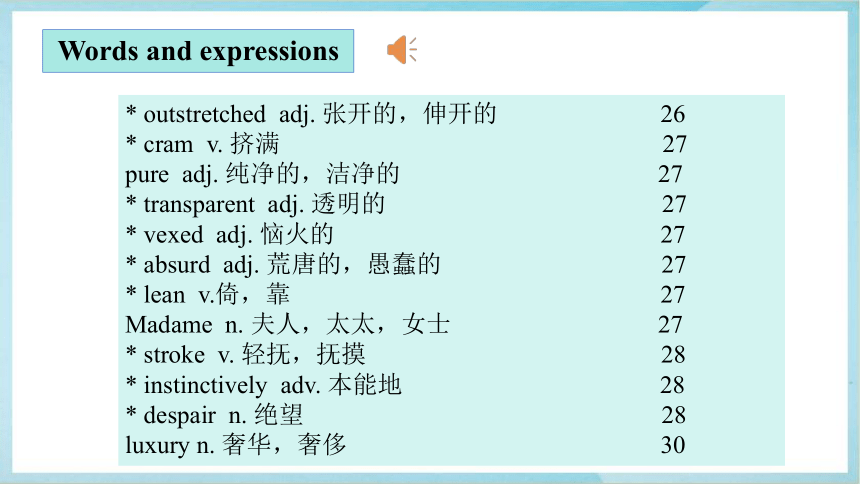
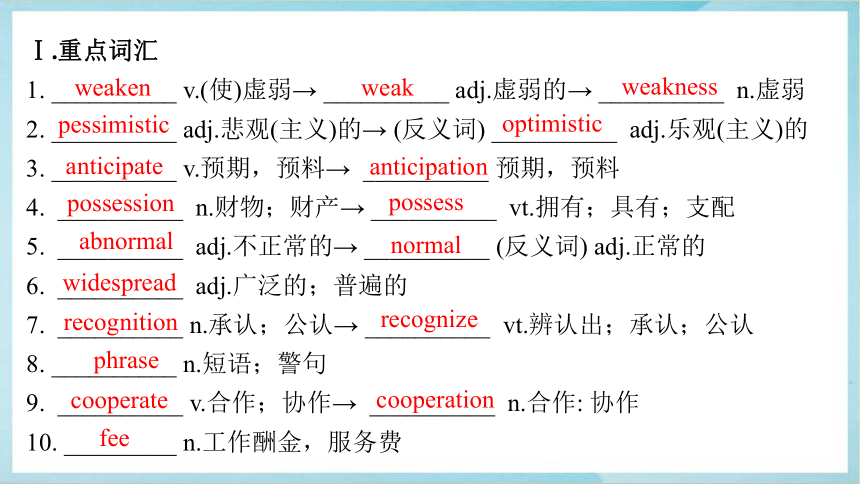
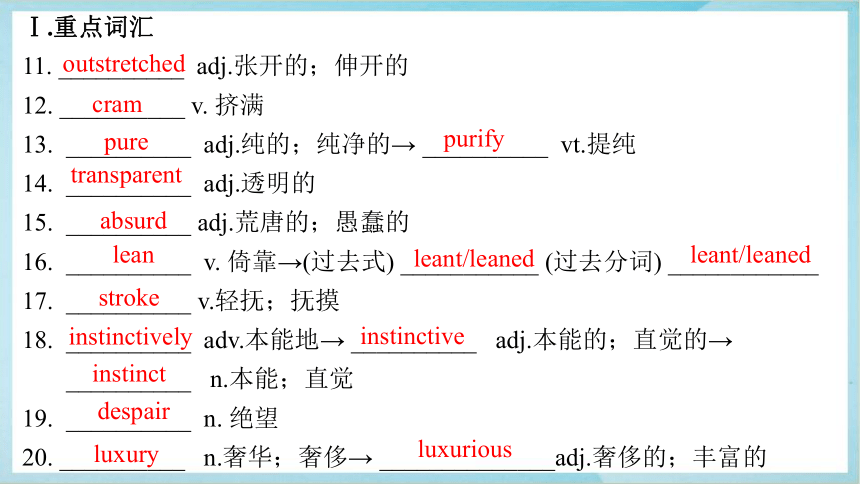
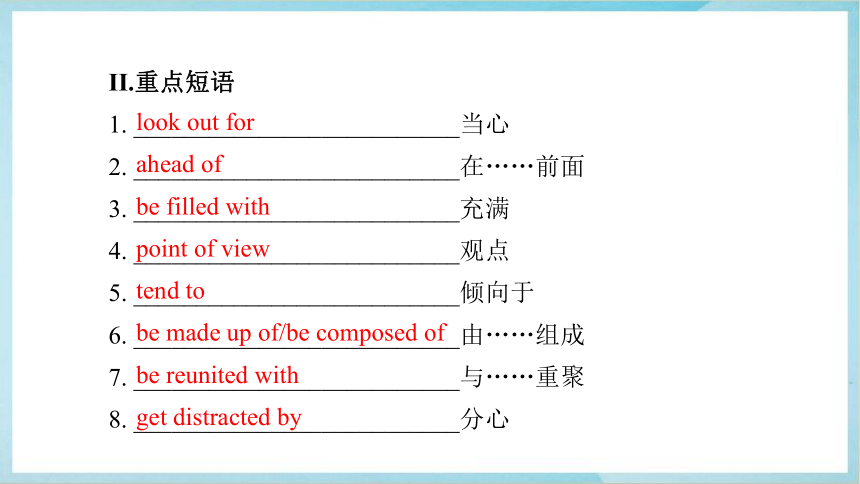
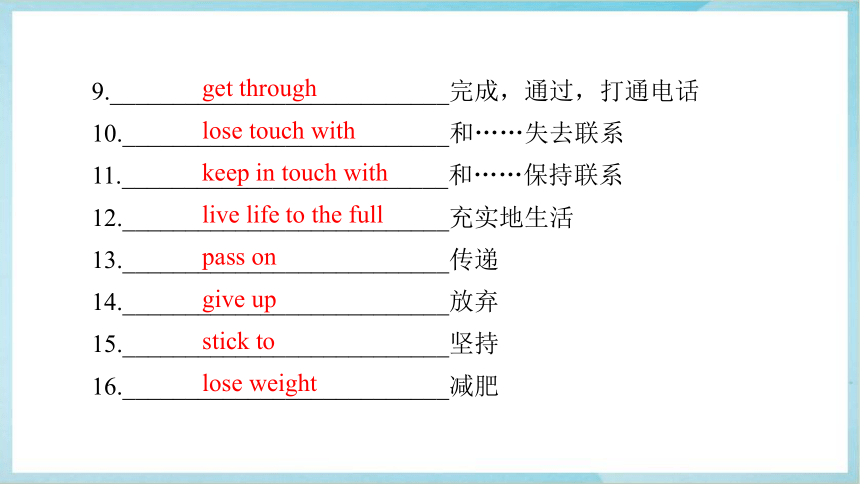
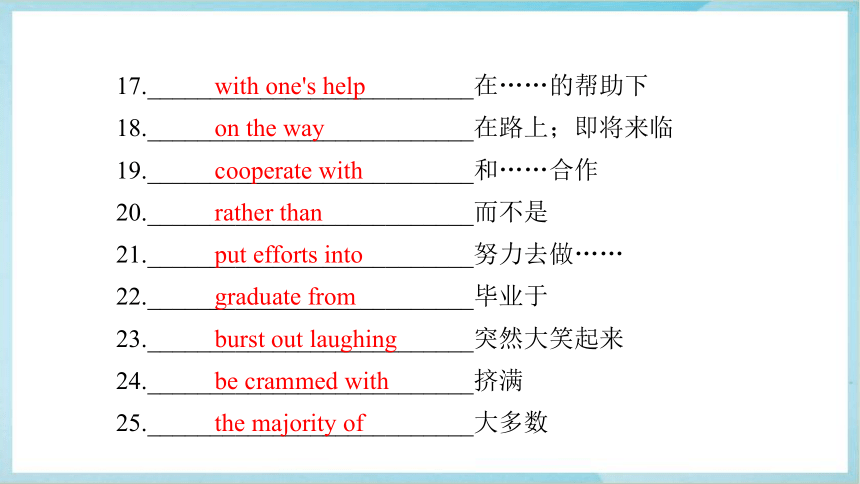
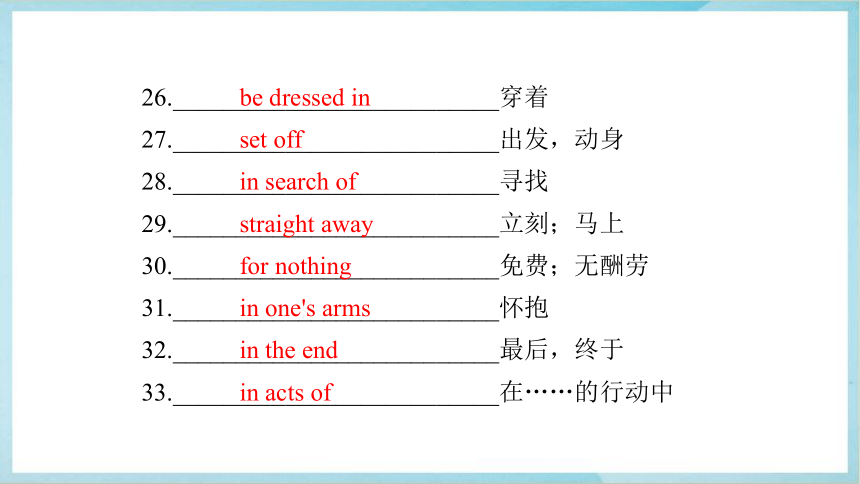
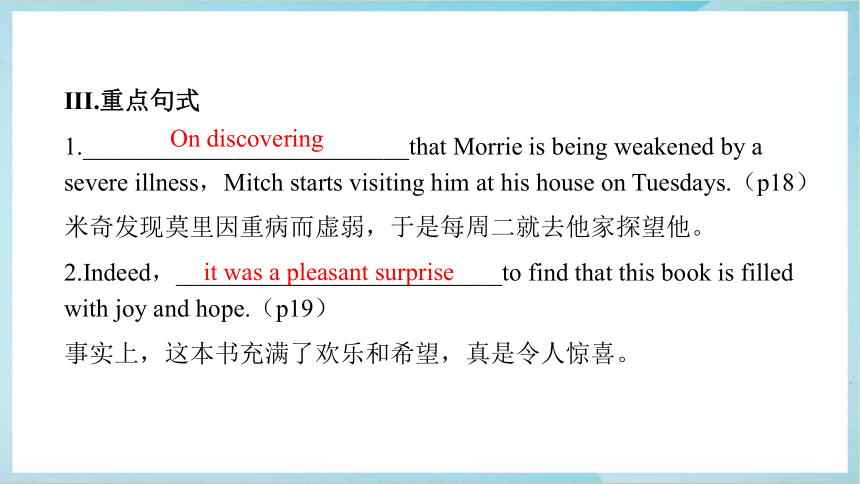
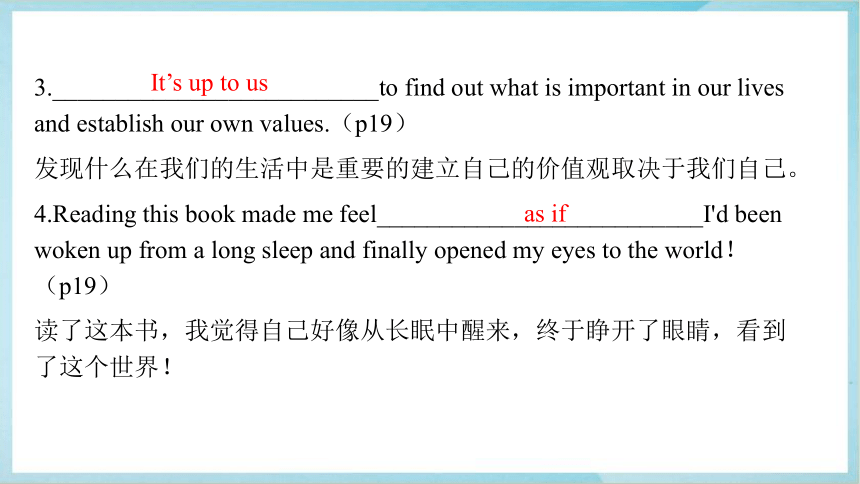
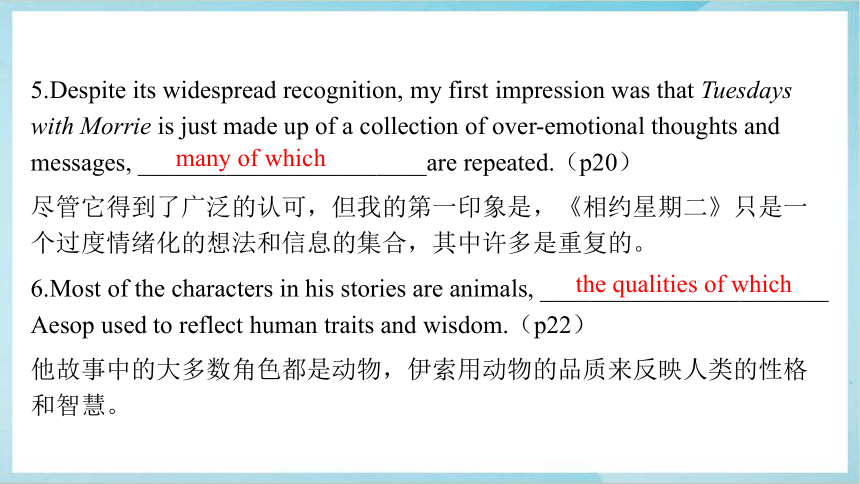
文档简介
(共43张PPT)
Unit 2 Developing ideas
THE BLUE BIRD
青鸟
阅读课件
To read the introduction and have a basic understanding of the play.
To read the passage--The Blue Bird and finish the reading exercises.
To appreciate the sentences that can reflect the features of the play.
To comprehend the language points and apply them into exercises.
Learning objectives
Words and expressions
* outstretched adj. 张开的,伸开的 26
* cram v. 挤满 27
pure adj. 纯净的,洁净的 27
* transparent adj. 透明的 27
* vexed adj. 恼火的 27
* absurd adj. 荒唐的,愚蠢的 27
* lean v.倚,靠 27
Madame n. 夫人,太太,女士 27
* stroke v. 轻抚,抚摸 28
* instinctively adv. 本能地 28
* despair n. 绝望 28
luxury n. 奢华,奢侈 30
Ⅰ.重点词汇
1. __________ v.(使)虚弱→ __________ adj.虚弱的→ __________ n.虚弱
2. __________ adj.悲观(主义)的→ (反义词) __________ adj.乐观(主义)的
3. __________ v.预期,预料→ __________ 预期,预料
4. __________ n.财物;财产→ __________ vt.拥有;具有;支配
5. __________ adj.不正常的→ __________ (反义词) adj.正常的
6. __________ adj.广泛的;普遍的
7. __________ n.承认;公认→ __________ vt.辨认出;承认;公认
8. __________ n.短语;警句
9. __________ v.合作;协作→ __________ n.合作: 协作
10. _________ n.工作酬金,服务费
weaken
weak
weakness
pessimistic
optimistic
anticipate
anticipation
possession
possess
abnormal
normal
widespread
recognition
recognize
cooperate
phrase
cooperation
fee
Ⅰ.重点词汇
11. __________ adj.张开的;伸开的
12. __________ v. 挤满
13. __________ adj.纯的;纯净的→ __________ vt.提纯
14. __________ adj.透明的
15. __________ adj.荒唐的;愚蠢的
16. __________ v. 倚靠→(过去式) ___________ (过去分词) ____________
17. __________ v.轻抚;抚摸
18. __________ adv.本能地→ __________ adj.本能的;直觉的→
__________ n.本能;直觉
19. __________ n. 绝望
20. __________ n.奢华;奢侈→ ______________adj.奢侈的;丰富的
outstretched
cram
pure
purify
transparent
absurd
lean
leant/leaned
leant/leaned
stroke
instinctively
instinctive
instinct
despair
luxury
luxurious
II.重点短语
1. __________________________当心
2. __________________________在……前面
3. __________________________充满
4. __________________________观点
5. __________________________倾向于
6. __________________________由……组成
7. __________________________与……重聚
8. __________________________分心
look out for
ahead of
be filled with
point of view
tend to
be made up of/be composed of
be reunited with
get distracted by
9.___________________________完成,通过,打通电话
10.__________________________和……失去联系
11.__________________________和……保持联系
12.__________________________充实地生活
13.__________________________传递
14.__________________________放弃
15.__________________________坚持
16.__________________________减肥
get through
lose touch with
keep in touch with
live life to the full
pass on
give up
stick to
lose weight
17.__________________________在……的帮助下
18.__________________________在路上;即将来临
19.__________________________和……合作
20.__________________________而不是
21.__________________________努力去做……
22.__________________________毕业于
23.__________________________突然大笑起来
24.__________________________挤满
25.__________________________大多数
with one's help
on the way
cooperate with
rather than
put efforts into
graduate from
burst out laughing
be crammed with
the majority of
26.__________________________穿着
27.__________________________出发,动身
28.__________________________寻找
29.__________________________立刻;马上
30.__________________________免费;无酬劳
31.__________________________怀抱
32.__________________________最后,终于
33.__________________________在……的行动中
be dressed in
set off
in search of
straight away
for nothing
in one's arms
in the end
in acts of
III.重点句式
1.__________________________that Morrie is being weakened by a severe illness,Mitch starts visiting him at his house on Tuesdays.(p18)
米奇发现莫里因重病而虚弱,于是每周二就去他家探望他。
2.Indeed,__________________________to find that this book is filled with joy and hope.(p19)
事实上,这本书充满了欢乐和希望,真是令人惊喜。
On discovering
it was a pleasant surprise
3.__________________________to find out what is important in our lives and establish our own values.(p19)
发现什么在我们的生活中是重要的建立自己的价值观取决于我们自己。
4.Reading this book made me feel__________________________I'd been woken up from a long sleep and finally opened my eyes to the world!(p19)
读了这本书,我觉得自己好像从长眠中醒来,终于睁开了眼睛,看到了这个世界!
It’s up to us
as if
5.Despite its widespread recognition, my first impression was that Tuesdays with Morrie is just made up of a collection of over-emotional thoughts and messages, _______________________are repeated.(p20)
尽管它得到了广泛的认可,但我的第一印象是,《相约星期二》只是一个过度情绪化的想法和信息的集合,其中许多是重复的。
6.Most of the characters in his stories are animals, _______________________ Aesop used to reflect human traits and wisdom.(p22)
他故事中的大多数角色都是动物,伊索用动物的品质来反映人类的性格和智慧。
many of which
the qualities of which
7.Recently,there ______________________ an increase in the number of mature students going to university, after working for a few or many years(p25)
最近,在工作了几年或许多年之后,上大学的成年学生人数有所增加。
8.In China, a man from Jiangsu Province graduated from university at the age of 88,______________________university graduate in the country.(p25)
在中国,一位来自江苏省的男子88岁大学毕业,成为中国年龄最大的大学毕业生。
9.Family first! That's______________________! (p25)
家庭第一!这才是最重要的!
has been
making him the oldest
what matters
10.______________________in 1921 in Shanghai by Chinese students, it was the first foreign play staged in China.(p26)
1921年由中国学生在上海演出,这是中国上演的第一部外国戏剧。
11.They dance merrily around the CHILDREN, then the one who appears to be the chief goes up to TYLTYL______________________.(p26)
他们欢快地围着孩子们跳舞,然后那个似乎是头儿的人伸出手走向泰尔蒂尔。
12.He is______________________the majority of men...(p27)
他并不比大多数人更荒唐……
Performed
will hand outstretched
no more absurd than
13.______________________the Blue Bird anywhere,the children say goodbye to their magical friends and return home.(p27)
在任何地方都找不到青鸟,孩子们向他们神奇的朋友道别,然后回家。
14.If any of you should find him,would you be ______________________ him back to us?(p28)
如果你们中有人能找到他,你们能把他还给我们吗?
15.The central idea of the play is that happiness is to be found___________in luxuries such as wealth, __________in simple things that are found in family life,and in acts of friendship and kindness.(p30)
该戏剧的中心思想是,幸福不在于财富等奢侈品,而在于家庭生活中的简单事物,以及友谊和善良的行为。
Unable to find
so very kind as to give
not
but
Maurice Maeterlinck ( 29 August 1862 - 6 May 1949)was a Belgian playwright, poet and essayist who wrote in French. He was awarded the Nobel Prize in Literature in 1911. The main themes in his work are death and the meaning of life. His plays form an important part of the Symbolist movement.
莫里斯·梅特林克(1862年8月29日- 1949年5月6日),比利时剧作家、诗人和散文家,以法语写作。1911年,他被授予诺贝尔文学奖。他作品的主题是死亡和生命的意义。他的戏剧是象征主义运动的重要组成部分。
Lead-in
Read the introduction to The Blue Bird and answer the questions.
1
1 Do you know the symbolic meaning of the Blue Bird in Chinese and Western cultures Share your understanding of the meaning with the class.
2 Where do you think the children find the Blue Bird
Lead-in
The Blue Bird is a 1908 play by Belgian playwright Maurice Maeterlinck(1862-1949), winner of the Nobel Prize in Literature in 1911. Maeterlinck wrote many plays, but The Blue Bird was the most popular and has been widely translated and adapted all over the world. [Performed in 1921 in Shanghai by Chinese students]过去分词短语作状语, it was the first foreign play staged (上演,举办,举行) in China.
The Blue Bird tells the tale of brother and sister, Tyltyl and Mytyl, as they are sent by a fairy to search for(寻找) the Blue Bird of Happiness. The children’s adventure takes them through many magical places before they at last find the Blue Bird in a most unexpected place.
《青鸟》是比利时剧作家莫里斯·梅特林克(1862-1949)——1911年诺贝尔文学奖获得者。于1908年创作的一部戏剧。梅特林克写了很多剧本,但《青鸟》是最受欢迎的,在世界各地被广泛翻译和改编。由中国学生于1921年在上海演出,它是第一部在中国上演的外国戏剧。
《青鸟》讲述了兄妹狄蒂尔和梅蒂尔被仙女派去寻找幸福的青鸟的故事。孩子们的冒险经历带他们穿越了许多神奇的地方,最后他们在一个最意想不到的地方找到了青鸟。
Lead-in
Read the introduction to The Blue Bird and answer the questions.
1
1 Do you know the symbolic meaning of the Blue Bird in Chinese and Western cultures Share your understanding of the meaning with the class.
In Western culture the Blue Bird symbolizes happiness and it brings good luck and health to people, while in Chinese culture the Blue Bird symbolises the messenger.
文化小贴士
《山海经》中记载,西王母外出前,会让青鸟报信
李商隐《无题》中写道:“蓬山此去无多路,青鸟殷勤为探看。”
Lead-in
Read the introduction to The Blue Bird and answer the questions.
1
2 Where do you think the children find the Blue Bird
Maybe it is a magical place filled with happiness.
Lead-in
1. What is the genre of the text
A play.
2.What are the features of the play
Drama is characterized by its use of dialogue, action, and performance to tell a story and convey themes. It often features a structured plot with characters, conflict, and a resolution. Drama can be performed live on stage or presented through film and television, engaging audiences through emotional and intellectual connections.
3.How many parts can this text be divided into
Setting,Stage Direction, Dialogue.
Setting
Setting
Stage Direction
Stage Direction
Stage Direction
Stage Direction
Stage Direction
Dialogue
Dialogue
Dialogue
Stage Direction
Dialogue
Dialogue
Dialogue
Dialogue
Text Frame
Fast-reading
Now read the play carefully and try to find out how to develop the story. You may keep an eye on Activity 2 (P29) in our text.
Careful reading
ACT IV SCENE II
Characters
Tyltyl, (Mytyl,) a troop of Happinesses,
the (chief) Happiness
Setting
Tyltyl and Mytyl have been searching for the Blue Bird in the Land of Memory, the Palace of Night and the Forest. Now they have arrived at the Palace of Happiness. A troop of Happinesses rush into the hall and speak to them.
Careful reading
The children come to the palace of Happiness and are welcomed by a troop of Happinesses. The children do not recognise them, but the Happinesses tell them that they are the only things the children know and they are all around them. Tyltyl wonders whether there are happinesses in his home, and at this, all the Happinesses burst out laughing. The Chief of the Happinesses tell him that his home is filled with Happinesses. The Chief introduces himself to Tyltyl as the Happiness of Being Well, and then introduces him to the other Happinesses: of Pure Air, of Loving One’s Parents, of the Blue Sky and of the Forest. Tyltyl just wants to ask the Happinesses one thing: the whereabouts of the Blue Bird.
Plot
ACT IV SCENE II
Careful reading
ACT VI SCENE II
Characters
Tyltyl, (Mytyl,) Mummy Tyl, the neighbour Berlingot, the little girl
Setting
Unable to find the Blue Bird anywhere, the children return home. While they are trying to tell their parents about their adventures, their neighbour comes in. She is asking for Tyltyl’s bird for her sick little girl.
Careful reading
(The neighbour Berlingot, a little woman leaning on a stick, enters Tyltyl’s home.) Berlingot is telling Mummy Tyltyl that Tyltyl’s bird is the one thing that will cure her sick daughter. Tyltyl then sees that his bird is blue – much bluer than when he left on his adventures. Tyltyl gives his bird to his neighbour’s daughter. The little girl is delighted, but as Tyltyl goes to take the bird to show the little girl how to feed it, the bird flies away.
The little girl lets out a cry of despair. Tyltyl comforts her and turns to the audience. He asks the people in the audience to return the Blue Bird if they see him, for the bird is needed for their
future happiness.
Plot
ACT VI SCENE II
Careful reading
From the first SCENE, we may find that although Tyltyl and Mytyl had been searching for the Blue Bird in the Land of Memory, they didn’t realise the fact that the Happinesses were all around them in their home. At the same time, they were all surrounded by Happiness without realising it actually.
From the second SCENE, we learn that through having various adventures, Tyltyl and Mytyl discover that their pet bird, the turtledove, has become bluer than ever. Their neighbor asked them to cure her sick daughter. Only then do they realize that the blue bird they are looking for is in their own home, which is also their future happiness to help others.
What can we learned from the play
Careful reading
Complete the notes with information from the play.
2
Learning to learn: what is a typical play
The basic elements of a play a
b
c
Acts and scenes
Characters in different acts and scenes
Settings and costumes
Post-reading
Learning to learn
The Blue Bird is a typical full-length play, which means it has several acts and each act is composed of several scenes. The whole play depicts actions that take place over a long period of time. Various characters appear in different acts and scenes, and the settings and costumes change accordingly. The running time of a full-length play can last for several hours, even days.
《蓝鸟》是一部典型的全剧,也就是说它有几幕,每幕由几个场景组成。整部戏描绘了发生在很长一段时间内的事件。不同的人物出现在不同的表演和场景中,背景和服装也随之变化。一部完整的戏剧的运行时间可以持续几个小时,甚至几天。
Post-reading
Complete the notes with information from the play.
2
ACT IV SCENE II
Characters:
Settings:
Plot:
Post-reading
Tyltyl, (Mytyl,) a troop of Happinesses, the (chief) Happiness
Tyltyl and Mytyl have been searching for the Blue Bird in the Land of Memory, the Palace of Night and the Forest. Now they have arrived at the Palace of Happiness. A troop of Happinesses rush into the hall and speak to them.
The children do not recognise them, but the Happinesses tell them that they are the only things the children know and they are all around them. Tyltyl wonders whether there are happinesses in his home, and at this, all the Happinesses burst out laughing. The Chief of the Happinesses tell him that his home is filled with Happinesses. The Chief introduces himself to Tyltyl as the Happiness of Being Well, and then introduces him to the other Happinesses: of Pure Air, of Loving One’s Parents, of the Blue Sky and of the Forest. Tyltyl just wants to ask the Happinesses one thing: the whereabouts of the Blue Bird.
The children come to the palace of Happiness and are welcomed by a troop of Happinesses...
Complete the notes with information from the play.
2
ACT VI SCENE II
Characters:
Settings:
Plot:
Post-reading
Tyltyl, (Mytyl,) Mummy Tyl, the neighbour Berlingot, the little girl
Unable to find the Blue Bird anywhere, the children return home. While they are trying to tell their parents about their adventures, their neighbour comes in. She is asking for Tyltyl’s bird for her sick little girl.
The children return home without finding the Blue Bird, only to find their dove becomes bluer and give it to the sick little girl, which makes her happy. But at last it flies away.
The little girl lets out a cry of despair. Tyltyl comforts her and turns to the audience. He asks the people in the audience to return the Blue Bird if they see him, for the bird is needed for their future happiness.
Complete the notes with information from the play.
2
Now work in groups and talk about how much you like the play. Give your reasons.
My understanding of "The Blue Bird" is that it's a profoundly imaginative and symbolic play. Through the journey of two children, it explores themes of happiness, love, and the essence of life. The play's rich imagery and metaphorical language make it both enchanting and thought-provoking, leaving a lasting impression on its audience.
The core message of "The Blue Bird" is that true happiness lies within one's self and appreciating the present moment, rather than seeking it externally.
I really enjoy "The Blue Bird" by Maurice Maeterlinck. It's a magical and thought-provoking play. I like it a lot because it takes me on an imaginative journey, exploring themes of happiness, love, and the essence of life. The characters are well-developed, and their quest for the blue bird symbolizes the search for inner peace and fulfillment. The play also has a beautiful blend of fantasy and reality, making it both enchanting and relatable. Overall, "The Blue Bird" is a cherished work that stays with me long after the curtain falls.
我对《蓝鸟》的理解是,这是一部极富想象力和象征意义的戏剧。 通过两个孩子的旅程,它探索了幸福、爱和生命本质的主题。 该剧丰富的意象和隐喻语言使其既迷人又发人深省,给观众留下了深刻的印象。
《蓝鸟》的核心信息是,真正的幸福存在于一个人的内心,并欣赏当下,而不是从外部寻求幸福。
我非常喜欢莫里斯·梅特林克的《蓝鸟》。 它是一部神奇而发人深省的戏剧。 我非常喜欢它,因为它带我踏上了一段充满想象力的旅程,探索幸福、爱情和生命本质的主题。 这些角色都很成熟,他们对蓝鸟的追求象征着对内心平静和满足的追求。 该剧还将幻想与现实完美地融合在一起,使其既迷人又能引起共鸣。 总的来说,《蓝鸟》是一部珍贵的作品,在落幕之后,它一直陪伴着我。
Post-reading
1. Why cannot Tyltyl recognise any of the Happinesses
2. Are there any Happiness in your home What are they Where else can you find them
Because he doesn’t realise the fact that the Happinesses are all around him in his home. In my aspects, although the Happinesses are always with him, they live in his life and can’t see or feel them.
Yes. My home is crammed with Happiness, such as the Happiness of Being Well, of Pure Air, of Loving One’s Parents, of the Blue Sky, of the Forest and so on.
They are love, care, health, warm and so on.
School, hospital, bus station and so on.
Think & Share
Post-reading
3. What does the author want to express by making the Blue Bird fly away at the end of the play
By making the Blue Bird fly away at the end of the play, the author wants to express a simple truth that happiness, just like the Blue Bird, might disappear if we don’t cherish it.
In a word, we need to find and feel the happiness around us. Otherwise, it will leave us.
Think & Share
Think & Share
4. What different life lessons can you learn from the two reading passages in this unit
Tuesdays with Morrie: It encourages us to appreciate what we have, and to make the most of each day.
THE BLUE BIRD: Only when you’re willing to give happiness to others can you be happy.
From the first one, we know that happiness is always around us, while it can’t fly away and be found again from the second one.
1 Read the play again and discuss how you might present it on stage. Consider the following:
Plot – Is there anything you will cut from, or add to the play
Setting – What costumes and props will you need
Roles – Will you need a narrator to give the background to the play and introduce the new scenes
Language – Will you revise the language to make it easier to remember
Work in groups and act out the play.
3
Post-reading
2 Adapt the play based on your discussion. You may refer to the original play for more ideas if necessary.
3 Decide roles for each group member and practice performing the play.
4 Act out the play in class.
Now talk about how well your group performed. Vote for the best performer in the play.
Work in groups and act out the play.
3
Show Time
Post-reading
1 Which of the following was the first foreign play staged in China
A The Merchant of Venice. B King Lear.
C Romeo and Juliet. D The Blue Bird.
2 How many happinesses were mentioned in the passage
A Three B five C Four D Six
3 According to the passage, which of the following is wrong
A The brother and sister didn’t find the Blue Bird at all.
B Tyltyl’s turtle-dove cure his neighbour’s little girl.
C Tyltyl would take his turtle-dove to the little girl for nothing.
D The little girl liked the bird very much.
Reading comprehension
D
B
A
Post-reading
4 What do you think the symbolic meaning of the Blue Bird is
A Wealth B Happiness C Health D Freedom
5 Where do you think the brother and sister found the Blue Bird
A In a remote village.
B In a forest.
C At their own home.
D At a palace.
B
C
Reading comprehension
Tyltyl and Mytyl 1__________________(search) for the Blue Bird in the Land of Memory when a troop of happinesses rushed into the hall, 2___________(sing). They introduced 3____________(they) to the brother and sister 4_________ (separate), who were surprised that happiness was around.
5________(able) to find the Blue Bird anywhere, the children said goodbye to their friends and returned home. While they were trying to tell their parents about their adventures, their neighbour came to ask for help, 6_______ sick daughter wanted Tyltyl pet bird. And the neighbour thought the bird could cure his daughter.
had been searching
singing
themselves
separately
Unable
whose
Grammar filling
So Tyltyl took his bird to the little girl 7_________ nothing. The little girl was so 8______________(delight) with the bird! However, the Dove escaped and 9__________(fly) away. Tyltyl was determined to catch him again and asked the audience to search for him. The main idea of the play is that happiness is to be found not in luxuries such as wealth, 10_____ in simple things that are found in family life, and in acts of friendship and kindness.
for
delighted
flew
but
Grammar filling
假设你是李华,最近,你校戏剧俱乐部要举办元旦庆祝喜剧汇演,请你写一封邀请信,邀请外籍教师Smith前来担任你组织的戏剧《哈姆雷特》中一个角色,内容包括:
1. 邀请理由;
2.为加深中西文化交流,戏剧增添中国元素;
3. 欢迎来中国进行文化交流。
注意:要求词数在150词左右。
Homework
Dear Mr. Smith,
I hope this letter finds you well. On behalf of our school's Drama Club, I am writing to cordially invite you to participate in our New Year's Comedy Gala by taking a role in our production of "Hamlet".
Your participation would greatly enrich our performance with your unique acting style and cultural insights. Moreover, we plan to infuse Chinese elements into the play to foster deeper Sino-Western cultural exchanges. It would be a wonderful opportunity for you to experience and contribute to this cultural blend.
We warmly welcome you to China and to this cultural exchange through our drama. Your involvement would undoubtedly make this event more memorable and meaningful.
Looking forward to your favorable reply.
Best regards,
Li Hua
Sample
Unit 2 Developing ideas
THE BLUE BIRD
青鸟
阅读课件
To read the introduction and have a basic understanding of the play.
To read the passage--The Blue Bird and finish the reading exercises.
To appreciate the sentences that can reflect the features of the play.
To comprehend the language points and apply them into exercises.
Learning objectives
Words and expressions
* outstretched adj. 张开的,伸开的 26
* cram v. 挤满 27
pure adj. 纯净的,洁净的 27
* transparent adj. 透明的 27
* vexed adj. 恼火的 27
* absurd adj. 荒唐的,愚蠢的 27
* lean v.倚,靠 27
Madame n. 夫人,太太,女士 27
* stroke v. 轻抚,抚摸 28
* instinctively adv. 本能地 28
* despair n. 绝望 28
luxury n. 奢华,奢侈 30
Ⅰ.重点词汇
1. __________ v.(使)虚弱→ __________ adj.虚弱的→ __________ n.虚弱
2. __________ adj.悲观(主义)的→ (反义词) __________ adj.乐观(主义)的
3. __________ v.预期,预料→ __________ 预期,预料
4. __________ n.财物;财产→ __________ vt.拥有;具有;支配
5. __________ adj.不正常的→ __________ (反义词) adj.正常的
6. __________ adj.广泛的;普遍的
7. __________ n.承认;公认→ __________ vt.辨认出;承认;公认
8. __________ n.短语;警句
9. __________ v.合作;协作→ __________ n.合作: 协作
10. _________ n.工作酬金,服务费
weaken
weak
weakness
pessimistic
optimistic
anticipate
anticipation
possession
possess
abnormal
normal
widespread
recognition
recognize
cooperate
phrase
cooperation
fee
Ⅰ.重点词汇
11. __________ adj.张开的;伸开的
12. __________ v. 挤满
13. __________ adj.纯的;纯净的→ __________ vt.提纯
14. __________ adj.透明的
15. __________ adj.荒唐的;愚蠢的
16. __________ v. 倚靠→(过去式) ___________ (过去分词) ____________
17. __________ v.轻抚;抚摸
18. __________ adv.本能地→ __________ adj.本能的;直觉的→
__________ n.本能;直觉
19. __________ n. 绝望
20. __________ n.奢华;奢侈→ ______________adj.奢侈的;丰富的
outstretched
cram
pure
purify
transparent
absurd
lean
leant/leaned
leant/leaned
stroke
instinctively
instinctive
instinct
despair
luxury
luxurious
II.重点短语
1. __________________________当心
2. __________________________在……前面
3. __________________________充满
4. __________________________观点
5. __________________________倾向于
6. __________________________由……组成
7. __________________________与……重聚
8. __________________________分心
look out for
ahead of
be filled with
point of view
tend to
be made up of/be composed of
be reunited with
get distracted by
9.___________________________完成,通过,打通电话
10.__________________________和……失去联系
11.__________________________和……保持联系
12.__________________________充实地生活
13.__________________________传递
14.__________________________放弃
15.__________________________坚持
16.__________________________减肥
get through
lose touch with
keep in touch with
live life to the full
pass on
give up
stick to
lose weight
17.__________________________在……的帮助下
18.__________________________在路上;即将来临
19.__________________________和……合作
20.__________________________而不是
21.__________________________努力去做……
22.__________________________毕业于
23.__________________________突然大笑起来
24.__________________________挤满
25.__________________________大多数
with one's help
on the way
cooperate with
rather than
put efforts into
graduate from
burst out laughing
be crammed with
the majority of
26.__________________________穿着
27.__________________________出发,动身
28.__________________________寻找
29.__________________________立刻;马上
30.__________________________免费;无酬劳
31.__________________________怀抱
32.__________________________最后,终于
33.__________________________在……的行动中
be dressed in
set off
in search of
straight away
for nothing
in one's arms
in the end
in acts of
III.重点句式
1.__________________________that Morrie is being weakened by a severe illness,Mitch starts visiting him at his house on Tuesdays.(p18)
米奇发现莫里因重病而虚弱,于是每周二就去他家探望他。
2.Indeed,__________________________to find that this book is filled with joy and hope.(p19)
事实上,这本书充满了欢乐和希望,真是令人惊喜。
On discovering
it was a pleasant surprise
3.__________________________to find out what is important in our lives and establish our own values.(p19)
发现什么在我们的生活中是重要的建立自己的价值观取决于我们自己。
4.Reading this book made me feel__________________________I'd been woken up from a long sleep and finally opened my eyes to the world!(p19)
读了这本书,我觉得自己好像从长眠中醒来,终于睁开了眼睛,看到了这个世界!
It’s up to us
as if
5.Despite its widespread recognition, my first impression was that Tuesdays with Morrie is just made up of a collection of over-emotional thoughts and messages, _______________________are repeated.(p20)
尽管它得到了广泛的认可,但我的第一印象是,《相约星期二》只是一个过度情绪化的想法和信息的集合,其中许多是重复的。
6.Most of the characters in his stories are animals, _______________________ Aesop used to reflect human traits and wisdom.(p22)
他故事中的大多数角色都是动物,伊索用动物的品质来反映人类的性格和智慧。
many of which
the qualities of which
7.Recently,there ______________________ an increase in the number of mature students going to university, after working for a few or many years(p25)
最近,在工作了几年或许多年之后,上大学的成年学生人数有所增加。
8.In China, a man from Jiangsu Province graduated from university at the age of 88,______________________university graduate in the country.(p25)
在中国,一位来自江苏省的男子88岁大学毕业,成为中国年龄最大的大学毕业生。
9.Family first! That's______________________! (p25)
家庭第一!这才是最重要的!
has been
making him the oldest
what matters
10.______________________in 1921 in Shanghai by Chinese students, it was the first foreign play staged in China.(p26)
1921年由中国学生在上海演出,这是中国上演的第一部外国戏剧。
11.They dance merrily around the CHILDREN, then the one who appears to be the chief goes up to TYLTYL______________________.(p26)
他们欢快地围着孩子们跳舞,然后那个似乎是头儿的人伸出手走向泰尔蒂尔。
12.He is______________________the majority of men...(p27)
他并不比大多数人更荒唐……
Performed
will hand outstretched
no more absurd than
13.______________________the Blue Bird anywhere,the children say goodbye to their magical friends and return home.(p27)
在任何地方都找不到青鸟,孩子们向他们神奇的朋友道别,然后回家。
14.If any of you should find him,would you be ______________________ him back to us?(p28)
如果你们中有人能找到他,你们能把他还给我们吗?
15.The central idea of the play is that happiness is to be found___________in luxuries such as wealth, __________in simple things that are found in family life,and in acts of friendship and kindness.(p30)
该戏剧的中心思想是,幸福不在于财富等奢侈品,而在于家庭生活中的简单事物,以及友谊和善良的行为。
Unable to find
so very kind as to give
not
but
Maurice Maeterlinck ( 29 August 1862 - 6 May 1949)was a Belgian playwright, poet and essayist who wrote in French. He was awarded the Nobel Prize in Literature in 1911. The main themes in his work are death and the meaning of life. His plays form an important part of the Symbolist movement.
莫里斯·梅特林克(1862年8月29日- 1949年5月6日),比利时剧作家、诗人和散文家,以法语写作。1911年,他被授予诺贝尔文学奖。他作品的主题是死亡和生命的意义。他的戏剧是象征主义运动的重要组成部分。
Lead-in
Read the introduction to The Blue Bird and answer the questions.
1
1 Do you know the symbolic meaning of the Blue Bird in Chinese and Western cultures Share your understanding of the meaning with the class.
2 Where do you think the children find the Blue Bird
Lead-in
The Blue Bird is a 1908 play by Belgian playwright Maurice Maeterlinck(1862-1949), winner of the Nobel Prize in Literature in 1911. Maeterlinck wrote many plays, but The Blue Bird was the most popular and has been widely translated and adapted all over the world. [Performed in 1921 in Shanghai by Chinese students]过去分词短语作状语, it was the first foreign play staged (上演,举办,举行) in China.
The Blue Bird tells the tale of brother and sister, Tyltyl and Mytyl, as they are sent by a fairy to search for(寻找) the Blue Bird of Happiness. The children’s adventure takes them through many magical places before they at last find the Blue Bird in a most unexpected place.
《青鸟》是比利时剧作家莫里斯·梅特林克(1862-1949)——1911年诺贝尔文学奖获得者。于1908年创作的一部戏剧。梅特林克写了很多剧本,但《青鸟》是最受欢迎的,在世界各地被广泛翻译和改编。由中国学生于1921年在上海演出,它是第一部在中国上演的外国戏剧。
《青鸟》讲述了兄妹狄蒂尔和梅蒂尔被仙女派去寻找幸福的青鸟的故事。孩子们的冒险经历带他们穿越了许多神奇的地方,最后他们在一个最意想不到的地方找到了青鸟。
Lead-in
Read the introduction to The Blue Bird and answer the questions.
1
1 Do you know the symbolic meaning of the Blue Bird in Chinese and Western cultures Share your understanding of the meaning with the class.
In Western culture the Blue Bird symbolizes happiness and it brings good luck and health to people, while in Chinese culture the Blue Bird symbolises the messenger.
文化小贴士
《山海经》中记载,西王母外出前,会让青鸟报信
李商隐《无题》中写道:“蓬山此去无多路,青鸟殷勤为探看。”
Lead-in
Read the introduction to The Blue Bird and answer the questions.
1
2 Where do you think the children find the Blue Bird
Maybe it is a magical place filled with happiness.
Lead-in
1. What is the genre of the text
A play.
2.What are the features of the play
Drama is characterized by its use of dialogue, action, and performance to tell a story and convey themes. It often features a structured plot with characters, conflict, and a resolution. Drama can be performed live on stage or presented through film and television, engaging audiences through emotional and intellectual connections.
3.How many parts can this text be divided into
Setting,Stage Direction, Dialogue.
Setting
Setting
Stage Direction
Stage Direction
Stage Direction
Stage Direction
Stage Direction
Dialogue
Dialogue
Dialogue
Stage Direction
Dialogue
Dialogue
Dialogue
Dialogue
Text Frame
Fast-reading
Now read the play carefully and try to find out how to develop the story. You may keep an eye on Activity 2 (P29) in our text.
Careful reading
ACT IV SCENE II
Characters
Tyltyl, (Mytyl,) a troop of Happinesses,
the (chief) Happiness
Setting
Tyltyl and Mytyl have been searching for the Blue Bird in the Land of Memory, the Palace of Night and the Forest. Now they have arrived at the Palace of Happiness. A troop of Happinesses rush into the hall and speak to them.
Careful reading
The children come to the palace of Happiness and are welcomed by a troop of Happinesses. The children do not recognise them, but the Happinesses tell them that they are the only things the children know and they are all around them. Tyltyl wonders whether there are happinesses in his home, and at this, all the Happinesses burst out laughing. The Chief of the Happinesses tell him that his home is filled with Happinesses. The Chief introduces himself to Tyltyl as the Happiness of Being Well, and then introduces him to the other Happinesses: of Pure Air, of Loving One’s Parents, of the Blue Sky and of the Forest. Tyltyl just wants to ask the Happinesses one thing: the whereabouts of the Blue Bird.
Plot
ACT IV SCENE II
Careful reading
ACT VI SCENE II
Characters
Tyltyl, (Mytyl,) Mummy Tyl, the neighbour Berlingot, the little girl
Setting
Unable to find the Blue Bird anywhere, the children return home. While they are trying to tell their parents about their adventures, their neighbour comes in. She is asking for Tyltyl’s bird for her sick little girl.
Careful reading
(The neighbour Berlingot, a little woman leaning on a stick, enters Tyltyl’s home.) Berlingot is telling Mummy Tyltyl that Tyltyl’s bird is the one thing that will cure her sick daughter. Tyltyl then sees that his bird is blue – much bluer than when he left on his adventures. Tyltyl gives his bird to his neighbour’s daughter. The little girl is delighted, but as Tyltyl goes to take the bird to show the little girl how to feed it, the bird flies away.
The little girl lets out a cry of despair. Tyltyl comforts her and turns to the audience. He asks the people in the audience to return the Blue Bird if they see him, for the bird is needed for their
future happiness.
Plot
ACT VI SCENE II
Careful reading
From the first SCENE, we may find that although Tyltyl and Mytyl had been searching for the Blue Bird in the Land of Memory, they didn’t realise the fact that the Happinesses were all around them in their home. At the same time, they were all surrounded by Happiness without realising it actually.
From the second SCENE, we learn that through having various adventures, Tyltyl and Mytyl discover that their pet bird, the turtledove, has become bluer than ever. Their neighbor asked them to cure her sick daughter. Only then do they realize that the blue bird they are looking for is in their own home, which is also their future happiness to help others.
What can we learned from the play
Careful reading
Complete the notes with information from the play.
2
Learning to learn: what is a typical play
The basic elements of a play a
b
c
Acts and scenes
Characters in different acts and scenes
Settings and costumes
Post-reading
Learning to learn
The Blue Bird is a typical full-length play, which means it has several acts and each act is composed of several scenes. The whole play depicts actions that take place over a long period of time. Various characters appear in different acts and scenes, and the settings and costumes change accordingly. The running time of a full-length play can last for several hours, even days.
《蓝鸟》是一部典型的全剧,也就是说它有几幕,每幕由几个场景组成。整部戏描绘了发生在很长一段时间内的事件。不同的人物出现在不同的表演和场景中,背景和服装也随之变化。一部完整的戏剧的运行时间可以持续几个小时,甚至几天。
Post-reading
Complete the notes with information from the play.
2
ACT IV SCENE II
Characters:
Settings:
Plot:
Post-reading
Tyltyl, (Mytyl,) a troop of Happinesses, the (chief) Happiness
Tyltyl and Mytyl have been searching for the Blue Bird in the Land of Memory, the Palace of Night and the Forest. Now they have arrived at the Palace of Happiness. A troop of Happinesses rush into the hall and speak to them.
The children do not recognise them, but the Happinesses tell them that they are the only things the children know and they are all around them. Tyltyl wonders whether there are happinesses in his home, and at this, all the Happinesses burst out laughing. The Chief of the Happinesses tell him that his home is filled with Happinesses. The Chief introduces himself to Tyltyl as the Happiness of Being Well, and then introduces him to the other Happinesses: of Pure Air, of Loving One’s Parents, of the Blue Sky and of the Forest. Tyltyl just wants to ask the Happinesses one thing: the whereabouts of the Blue Bird.
The children come to the palace of Happiness and are welcomed by a troop of Happinesses...
Complete the notes with information from the play.
2
ACT VI SCENE II
Characters:
Settings:
Plot:
Post-reading
Tyltyl, (Mytyl,) Mummy Tyl, the neighbour Berlingot, the little girl
Unable to find the Blue Bird anywhere, the children return home. While they are trying to tell their parents about their adventures, their neighbour comes in. She is asking for Tyltyl’s bird for her sick little girl.
The children return home without finding the Blue Bird, only to find their dove becomes bluer and give it to the sick little girl, which makes her happy. But at last it flies away.
The little girl lets out a cry of despair. Tyltyl comforts her and turns to the audience. He asks the people in the audience to return the Blue Bird if they see him, for the bird is needed for their future happiness.
Complete the notes with information from the play.
2
Now work in groups and talk about how much you like the play. Give your reasons.
My understanding of "The Blue Bird" is that it's a profoundly imaginative and symbolic play. Through the journey of two children, it explores themes of happiness, love, and the essence of life. The play's rich imagery and metaphorical language make it both enchanting and thought-provoking, leaving a lasting impression on its audience.
The core message of "The Blue Bird" is that true happiness lies within one's self and appreciating the present moment, rather than seeking it externally.
I really enjoy "The Blue Bird" by Maurice Maeterlinck. It's a magical and thought-provoking play. I like it a lot because it takes me on an imaginative journey, exploring themes of happiness, love, and the essence of life. The characters are well-developed, and their quest for the blue bird symbolizes the search for inner peace and fulfillment. The play also has a beautiful blend of fantasy and reality, making it both enchanting and relatable. Overall, "The Blue Bird" is a cherished work that stays with me long after the curtain falls.
我对《蓝鸟》的理解是,这是一部极富想象力和象征意义的戏剧。 通过两个孩子的旅程,它探索了幸福、爱和生命本质的主题。 该剧丰富的意象和隐喻语言使其既迷人又发人深省,给观众留下了深刻的印象。
《蓝鸟》的核心信息是,真正的幸福存在于一个人的内心,并欣赏当下,而不是从外部寻求幸福。
我非常喜欢莫里斯·梅特林克的《蓝鸟》。 它是一部神奇而发人深省的戏剧。 我非常喜欢它,因为它带我踏上了一段充满想象力的旅程,探索幸福、爱情和生命本质的主题。 这些角色都很成熟,他们对蓝鸟的追求象征着对内心平静和满足的追求。 该剧还将幻想与现实完美地融合在一起,使其既迷人又能引起共鸣。 总的来说,《蓝鸟》是一部珍贵的作品,在落幕之后,它一直陪伴着我。
Post-reading
1. Why cannot Tyltyl recognise any of the Happinesses
2. Are there any Happiness in your home What are they Where else can you find them
Because he doesn’t realise the fact that the Happinesses are all around him in his home. In my aspects, although the Happinesses are always with him, they live in his life and can’t see or feel them.
Yes. My home is crammed with Happiness, such as the Happiness of Being Well, of Pure Air, of Loving One’s Parents, of the Blue Sky, of the Forest and so on.
They are love, care, health, warm and so on.
School, hospital, bus station and so on.
Think & Share
Post-reading
3. What does the author want to express by making the Blue Bird fly away at the end of the play
By making the Blue Bird fly away at the end of the play, the author wants to express a simple truth that happiness, just like the Blue Bird, might disappear if we don’t cherish it.
In a word, we need to find and feel the happiness around us. Otherwise, it will leave us.
Think & Share
Think & Share
4. What different life lessons can you learn from the two reading passages in this unit
Tuesdays with Morrie: It encourages us to appreciate what we have, and to make the most of each day.
THE BLUE BIRD: Only when you’re willing to give happiness to others can you be happy.
From the first one, we know that happiness is always around us, while it can’t fly away and be found again from the second one.
1 Read the play again and discuss how you might present it on stage. Consider the following:
Plot – Is there anything you will cut from, or add to the play
Setting – What costumes and props will you need
Roles – Will you need a narrator to give the background to the play and introduce the new scenes
Language – Will you revise the language to make it easier to remember
Work in groups and act out the play.
3
Post-reading
2 Adapt the play based on your discussion. You may refer to the original play for more ideas if necessary.
3 Decide roles for each group member and practice performing the play.
4 Act out the play in class.
Now talk about how well your group performed. Vote for the best performer in the play.
Work in groups and act out the play.
3
Show Time
Post-reading
1 Which of the following was the first foreign play staged in China
A The Merchant of Venice. B King Lear.
C Romeo and Juliet. D The Blue Bird.
2 How many happinesses were mentioned in the passage
A Three B five C Four D Six
3 According to the passage, which of the following is wrong
A The brother and sister didn’t find the Blue Bird at all.
B Tyltyl’s turtle-dove cure his neighbour’s little girl.
C Tyltyl would take his turtle-dove to the little girl for nothing.
D The little girl liked the bird very much.
Reading comprehension
D
B
A
Post-reading
4 What do you think the symbolic meaning of the Blue Bird is
A Wealth B Happiness C Health D Freedom
5 Where do you think the brother and sister found the Blue Bird
A In a remote village.
B In a forest.
C At their own home.
D At a palace.
B
C
Reading comprehension
Tyltyl and Mytyl 1__________________(search) for the Blue Bird in the Land of Memory when a troop of happinesses rushed into the hall, 2___________(sing). They introduced 3____________(they) to the brother and sister 4_________ (separate), who were surprised that happiness was around.
5________(able) to find the Blue Bird anywhere, the children said goodbye to their friends and returned home. While they were trying to tell their parents about their adventures, their neighbour came to ask for help, 6_______ sick daughter wanted Tyltyl pet bird. And the neighbour thought the bird could cure his daughter.
had been searching
singing
themselves
separately
Unable
whose
Grammar filling
So Tyltyl took his bird to the little girl 7_________ nothing. The little girl was so 8______________(delight) with the bird! However, the Dove escaped and 9__________(fly) away. Tyltyl was determined to catch him again and asked the audience to search for him. The main idea of the play is that happiness is to be found not in luxuries such as wealth, 10_____ in simple things that are found in family life, and in acts of friendship and kindness.
for
delighted
flew
but
Grammar filling
假设你是李华,最近,你校戏剧俱乐部要举办元旦庆祝喜剧汇演,请你写一封邀请信,邀请外籍教师Smith前来担任你组织的戏剧《哈姆雷特》中一个角色,内容包括:
1. 邀请理由;
2.为加深中西文化交流,戏剧增添中国元素;
3. 欢迎来中国进行文化交流。
注意:要求词数在150词左右。
Homework
Dear Mr. Smith,
I hope this letter finds you well. On behalf of our school's Drama Club, I am writing to cordially invite you to participate in our New Year's Comedy Gala by taking a role in our production of "Hamlet".
Your participation would greatly enrich our performance with your unique acting style and cultural insights. Moreover, we plan to infuse Chinese elements into the play to foster deeper Sino-Western cultural exchanges. It would be a wonderful opportunity for you to experience and contribute to this cultural blend.
We warmly welcome you to China and to this cultural exchange through our drama. Your involvement would undoubtedly make this event more memorable and meaningful.
Looking forward to your favorable reply.
Best regards,
Li Hua
Sample
